xxx
xxx

xxx
xxx
24 min., 2017, Natalie Bookchin
Now he’s out in public and everyone can see addresses fraught conversations about race online, documenting the internet as a site of struggle and discord, and the poisonous and volatile moment of social media’s assent as it intersected with beginning of Obama era, before Trayvon Martin, before Black Lives Matter, and before Trump. This was a period that some claimed would be “post racial” but instead ushered in a rise in expressions of overt racism and a backlash against a perceived threat of black publicness into spaces of power, historically and normatively constituted as white.
10 min., 2017, Cecilia Aldarondo
xx min., 2016, L.J. Roberts, Christopher Jones, Ted Kerr, and Niknaz
In an age where condoms are—for some—a loaded symbol of “AIDS Inc” and the systemic discrimination leveled against profiled and monitored bodies; and at a time pharmaceutical interventions such as PEP and PrEP are seemingly reducing the need for condoms; and at a time where carrying a condom can lead to arrest, what is one to make of the rubber? What does it smell, sound, feel like, to burn a condom?
109 min., 1995, Nilita Vachani
In today’s globalized economy the first world mother is able to go out and work because of the services of the third world woman who replaces her at home. Josephine Perera, a migrant worker from Sri Lanka, has spent the last ten years taking care of the homes and families of others. Through her story we are witness to the restructuring of societies when women become bread-winners in foreign lands. Ironically it is through their gender functions that they earn their economic freedom but to the detriment of family and culture and with no hope of assimilation in either world.
xx min., 2017, Shelly Eversley and Laurie Hurson
1996, Cheryl Dunye
“It’s a powerful piece of art that allows us to think about who has access to representation, who has access to archives, and why women, people of color, and queer people have not had access to these powerful instruments.”
– Alexandra Juhasz, one of the film’s original producers.
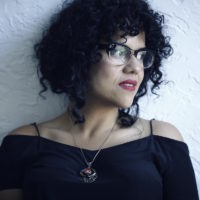
Cecilia Aldarondo holds an M.A. from Goldsmiths College and Ph.D. from the University of Minnesota, and is Assistant Professor of Film at Skidmore College. Her award-winning personal documentary MEMORIES OF A PENITENT HEART had its World Premiere at the Tribeca Film Festival in 2016 and will broadcast nationally on POV in 2017. A co-production of POV, Latino Public Broadcasting, and ITVS, MEMORIES has received additional support from the MacDowell Colony, the Sundance Institute, Jerome Foundation, Firelight Media, and New York State Council on the Arts, among others. In 2015 Aldarondo was selected for IFP’s Independent Filmmaker Labs and Sundance Institute’s Edit and Story Lab, and was the winner of the 2015 Paley DocPitch. Aldarondo was the inaugural recipient of the Roberto Guerra Documentary Award in 2015, was named by FILMMAKER Magazine as one of 2015’s ‘25 New Faces of Independent Film,’ and is a 2017 Women at Sundance Fellow.
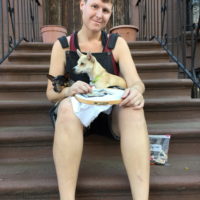
L.J. Roberts is a visual artist living in Brooklyn, NY who creates large-scale textile installations, incredibly detailed embroideries, screenprints, and collages. Their work investigates overlaps of queer and trans politics, activism, protest and craft through an intersectional feminist lens. LJ’s work has been shown in the United States, United Kingdom, Canada, South Africa, and Australia at such venues as The Victoria and Albert Museum, The Brooklyn Museum,Yerba Buena Center of the Arts, The Orange County Museum of Art, The Leslie-Lohman Museum of Gay and Lesbian Art, The Powerhouse Museum, DePaul Art Museum, The Bowdoin College Museum of Art, and the Smithsonian Museum of American Art where their work is in the permanent collection. LJ has been the past recipient of a MacDowell Colony Fellowship and residencies at Ox-Bow School of Art, ACRE, and The Bag Factory. LJ was one of nine recipients of the White House Champion of Change Award for LGBTQ Artists in 2015. They teach at Parsons School of Design.
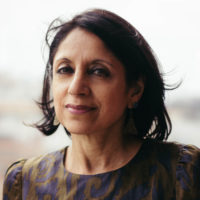
Nilita Vachani is a documentary filmmaker, writer and educator who divides her time between India and New York. Her documentaries, Eyes of Stone, Diamonds in a Vegetable Market and When Mother Comes Home for Christmas have been screened internationally to great critical acclaim and have received many awards. At present she is working on a documentary hybrid entitled Reborn in Clay on forensic art. Nilita’s films have been featured in the books Global Woman (Ehrenreich & Hochschild, 2003), Left in the Dark (Stuart Klawans, 2002), Moving People Moving Images (Brown, Iordanova & Torchin, 2010) and Fly in the Curry (Monteiro & JayaShankar, 2016). Nilita’s debut novel HomeSpun won Foreword’s choice fiction award in 2008. Her recent non-fiction writing on a domestic worker whose identity was stolen by her employer and used in a massive insider trading scandal was published in the Nation and in Caravan and won her the Asian College of Journalism’s inaugural prize for investigative journalism in 2016. Nilita has also worked as an assistant director and script supervisor and as an editor on documentary films. She has been teaching documentary film at the Tisch School of the Arts since 2008 and has held visiting positions at universities in India and the United States.
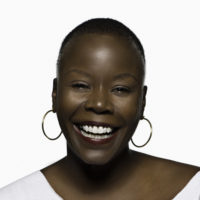
Shelly Eversley teaches literature, feminism, and black studies at Baruch College, The City University of New York, where she is Associate Professor of English. She is Academic Director of The City University of New York’s Faculty Fellowship Publication Program and founder of equalityarchive.com. She is the author of The “Real” Negro: The Question of Authenticity in Twentieth Century African American Literature as well as several essays on literature, race, and culture. She is editor of The Sexual Body and The 1970s, both special issues of WSQ, a journal by the Feminist Press. She is also editor of the forthcoming book Black Art, Politics, and Aesthetics in 1960s African American Literature and Culture (Cambridge), and is writing a new book titled The Practice of Blackness, or Integration’s Discontents in Postwar African American Literature.

Laurie Hurson is a PhD Candidate in the Environmental Psychology program at The Graduate Center, CUNY. Her dissertation explores how undergraduate students utilize resources and technologies to engage in their course work and college learning experiences. She is interested in students’ development of learning ecologies and possibilities for critical pedagogical approaches that support multiple forms of learning. She works at Baruch College’s Center for Teaching and Learning and as an Instructional Technology Fellow at Macaulay Honor’s College.
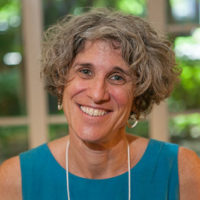
Dr. Alexandra Juhasz is the chair of the Film Department at Brooklyn College, CUNY. She makes and studies committed media practices that contribute to political change and individual and community growth. She is the author of AIDS TV: Identity, Community and Alternative Video (Duke University Press, 1995); Women of Vision: Histories in Feminist Film and Video (University of Minnesota Press, 2001); F is for Phony: Fake Documentary and Truth’s Undoing, co-edited with Jesse Lerner (Minnesota, 2005); Learning from YouTube (MIT Press, 2011: https://mitpress.mit.edu/books/learning-youtube); co-edited with Alisa Lebow, The Blackwell Companion on Contemporary Documentary (2015) and with Yvonne Welbon, Sisters in the Life: 25 Years of African-American Lesbian Filmmaking (Duke University Press, 2016). Dr. Juhasz is also the producer of educational videotapes on feminist issues from AIDS to teen pregnancy as well as the feature films The Watermelon Woman (Cheryl Dunye, 1997) and The Owls (Dunye, 2010). Her current work is on and about feminist Internet culture including YouTube (aljean.wordpress.com) and feminist pedagogy and community (feministonlinespaces.com and ev-ent-anglement.com). With Anne Balsamo, she was co-facilitator of the network, FemTechNet, which debuted its feminist rethinking of a MOOC, a Distributed Online Open Course “Dialogues in Feminist Technology” in Fall 2013: femtechnet.org.
UnionDocs is grateful for support from:

Join our monthly cineclub each month & listen in to the interview podcast for a thoughtful community around films that demand deeper discussion.